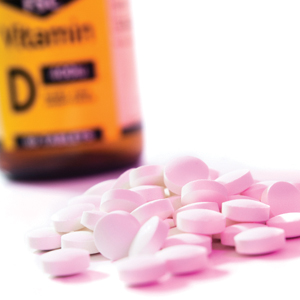GPs warned high doses of vitamin D could be harmful for elderly

Prescribing vitamin D supplements at high doses does not offer any benefit to elderly people and could even put them at an increased risk of falls, Swiss researchers have warned.
Their study was set up to test whether giving higher doses of vitamin D – including doses that have been recommended by the National Osteoporosis Society for patients with vitamin D deficiencies – would be better at preventing functional decline in people over 70 who had already suffered a fall when compared with a more moderate dose.
But the team found people who took a high-dose vitamin D supplement had no slower decline in function and were actually more likely to suffer another fall.
The study included 200 men and women, with an average age of 78 years, who were randomly assigned to take a high dose of vitamin D – 60,000IU vitamin D3, or 24,000IU vitamin D3 combined 300 calcifediol, a more potent form of the vitamin – or the lower dose of 24,000 IU of vitamin D3, once a month.
Both the group taking the monthly 60,000IU vitamin D3 dose (equivalent to a daily dose of 2,000IU or 50µg vitamin D3) and the 24,000IU calcifediol dose were more likely to achieve target vitamin D levels, compared with the group on the monthly 24,000IU vitamin D3 dose (equivalent to 800IU or 20 µg vitamin D3 daily).
However, the people taking higher doses did not experience any improvements in lower extremity function after 12 months and had statistically significantly higher rates of falls – two-thirds of these patients fell during follow-up compared with less than half of people on the lower dose.
The researchers concluded: ‘High monthly doses of vitamin D… may not be warranted in seniors with a prior fall because of a potentially deleterious effect on falls.’
Current UK guidance from the Department of Health supports blanket prescribing of vitamin D in over-65s, at a daily dose of 400IU (10µg), while National Osteoporosis Guidelines suggest doses of up to 2,000IU a day – or 60,000IU a month – may be given to people with vitamin D deficiency.
Dr Tony Brzezicki, GP and clinical chair at Croydon CCG, told Pulse it was unlikely that many elderly patients would be on this high a dose of vitamin D, but that ‘it should not be difficult to identify these patients from GP systems though’.
Dr Brzezicki added that high-dose therapy might need to be ‘included on the list of medicines which can cause falls prior to falls clinic referrals, or in the falls clinic itself’.
JAMA Int Med 2016; available online 4 January
Visit Pulse Reference for details on 140 symptoms, including easily searchable symptoms and categories, offering you a free platform to check symptoms and receive potential diagnoses during consultations.










